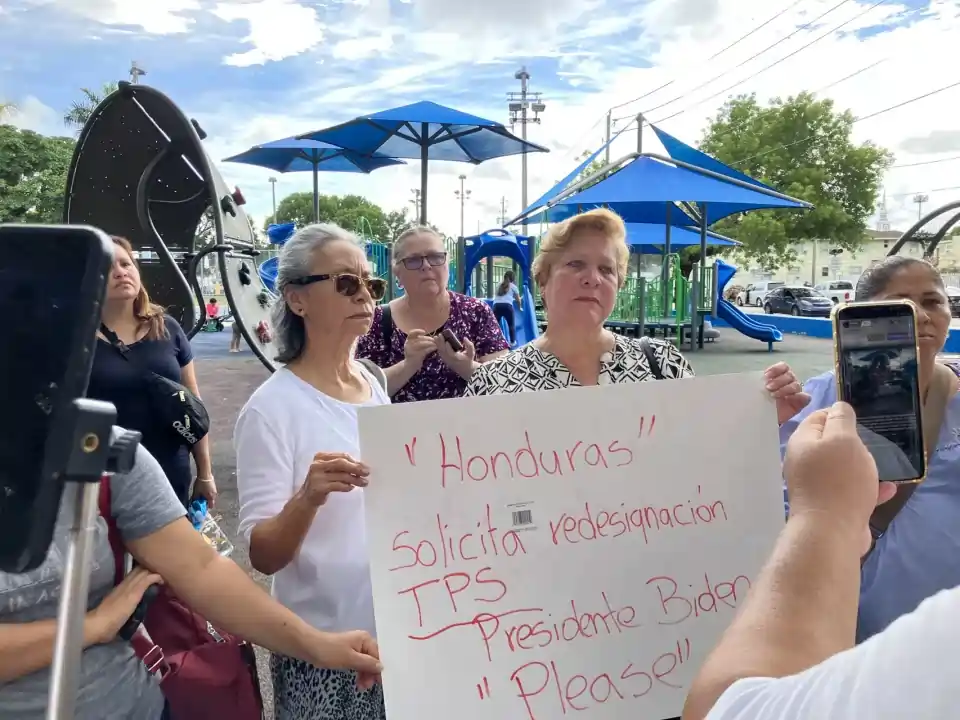The feared SB 1718 law, which severely punishes undocumented immigrants and those who help them, went into effect Saturday in Florida amid protests and calls to unite and use the vote to fight what Latino leaders defined as an “attack from the extreme right.”
“Today is a very important day because Florida is under attack. We are being victimized by a governor who has used and continues to use the state as a political platform to send a strong far-right message,” said Soraya Márquez, director of Mi Familia Vota in this state, during the Mexico, Central and South America Migration Convention being held this Saturday in Miami.
The objective of this meeting convened by different pro-immigrant organizations is to define “a plan of action with strategies and concrete objectives” against SB 1718 and the policies of Governor Ron DeSantis.
In addition, demonstrations against SB 1718 have been called for later in the day in a dozen Florida cities, although it is likely that fewer people will participate than in previous days, since the law is already in effect and there is “fear” in the community, one of the organizers told EFE.
Florida’s New Immigration Law: Transportation of Undocumented Immigrants
FEAR TO PROTEST
The “fear” of undocumented immigrants, which has led many to leave Florida already, is just one of the effects of this law promoted by DeSantis, who aspires to be president of the U.S. and is already campaigning to be elected the Republican candidate in the 2024 presidential elections.
However, Detective Argemis Colomé, spokesman for the Miami-Dade County Police Department, who attended the Immigration Convention, told EFE that the law “does not change much” the work of the officers of that police force.
According to Colomé, the Miami Dade Police Department’s legal team has only found one aspect of the law that forces them to act differently than before, and that is that bringing an undocumented person to Florida from another state, even a family member, is considered a second-degree felony.
Before, in a case like this, the agents had to call the state agencies in charge of irregular immigration, Colomé said.
“The police are not going to ask about your immigration status if they stop you for a traffic matter, nor are they going to ask anyone who reports that he or she has been the victim of a crime,” Colomé said.
“The law will impact the person who is committing a crime, not the person who is working, not the person who is in his car, not the friends or families who do not have papers and are with you,” he said.
However, the detective acknowledged that he could not say for sure how police departments in other counties or sheriffs throughout Florida will act.
EXODUS AND ECONOMY
The new law, which is part of a package of more than 200 laws approved this year by the Florida Congress, including some ultra-conservative ones, obliges companies with more than 25 workers to use an official program to verify the immigration status of each one, under penalty of fines and loss of license.
In addition, hospitals that accept public health insurance (Medicaid) must ask and record whether their patients are legal residents or not.
One of the messages that was heard the most during the convention, which was attended by the Consul General of Mexico in Miami, Jonathan Chait, is that the so-called “anti-immigrant” law not only affects them “but all the people who live in the state”.
The undocumented immigrants, who, according to Márquez told EFE, number more than one million in Florida, are essential to the three sectors that drive the economy, agriculture, construction and tourism, where the labor shortage caused by the exodus of workers from Florida to the two Carolinas and Georgia is already being felt.
The result for Floridians can be summed up in one word: more expensive, said the board of directors of MI Familia Vota.
Héctor Sánchez Barba, president and executive director of the same organization, emphasized that civic participation and the creation of a Latino political power is the best solution to confront “racist and extremist” attacks that “are not new”.
In Marquez’s opinion, now is the time to create a movement that integrates the entire community to stop DeSantis in the next elections in which he runs, whether it is the 2024 presidential election or the 2026 gubernatorial election.
READ ALSO:
Impact of Florida’s New Immigration Law on Undocumented Immigrants
Peaceful Protests in Florida Against New Anti-Immigrant Law
Protecting Immigrants in Florida: New Anti-Immigrant Law and Self-Preservation

